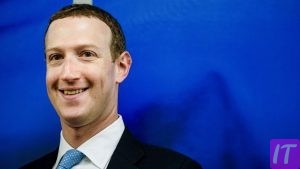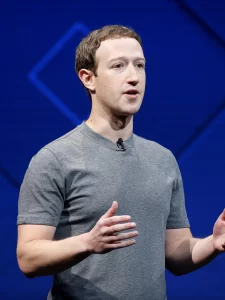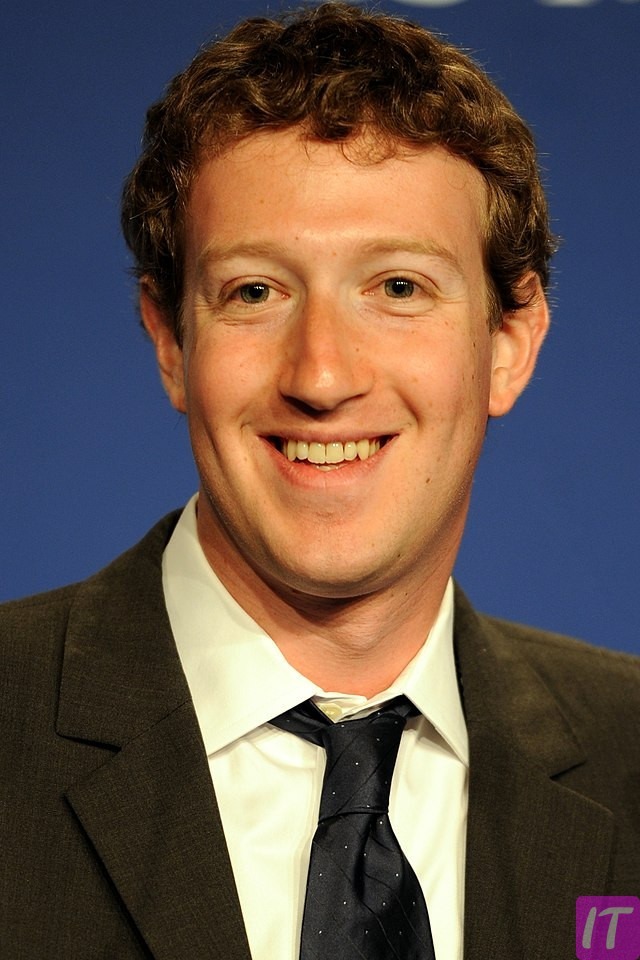Mark Zuckerberg: A Comprehensive Biography of Facebook’s Co-Founder and CEO
Mark Zuckerberg, the co-founder and CEO of Facebook, has etched his name into the annals of history as one of the most influential tech innovators of the 21st century. His journey from a young scholar to a global tech mogul is a story of incredible vision, persistence, and determination. This comprehensive biography traces the major milestones of Zuckerberg’s life, from his early years to his breakthrough moments and his profound impact on social media and global communication.
The Early Life of a Scholar
Mark Elliot Zuckerberg was born on May 14, 1984, in White Plains, New York. He grew up in a well-educated family; his father, Edward Zuckerberg, was a dentist, and his mother, Karen, was a psychiatrist. Mark was the second of four children in the Zuckerberg household, and his upbringing was characterized by a strong emphasis on education and learning.
From an early age, Mark exhibited a keen interest in technology and programming. By the age of 12, he had already created a messaging program called “ZuckNet,” which his family used to communicate within the house. This early foray into software development was just a glimpse of what was to come.
Mark’s parents recognized his potential and supported his interests by providing him with a computer and enrolling him in extracurricular courses in programming. His early mentor, David Newman, a software developer, further fueled his passion by teaching him advanced programming skills.
Mark attended Ardsley High School, where he excelled in classes and developed a reputation as a prodigious student. However, it was not just his technical acumen that set him apart; he also had a natural talent for understanding people and social dynamics, a skill that would later become pivotal in his career.
Mark’s early life was not solely focused on academics and technology. He was also an avid athlete, particularly in fencing, and he served as the captain of the fencing team. This blend of intellectual prowess and physical discipline laid a solid foundation for his future endeavors.
A Journey Through Education
After completing high school, Zuckerberg enrolled at Phillips Exeter Academy, a prestigious boarding school in New Hampshire. Here, he continued to hone his programming skills and delved deeper into computer science. It was also at Exeter that Mark began to develop his entrepreneurial spirit.
In 2002, Zuckerberg entered Harvard University, where he quickly made a name for himself as a programming prodigy. He created several projects during his time at Harvard, including “CourseMatch,” a program that helped students choose their classes based on the courses that other users had selected, and “Facemash,” a website that allowed users to rate the attractiveness of students. Though “Facemash” was shut down by the university, it demonstrated Mark’s innovative thinking and expertise in coding.
Harvard proved to be a fertile ground for Zuckerberg’s ideas. In February 2004, along with his roommates Eduardo Saverin, Andrew McCollum, Dustin Moskovitz, and Chris Hughes, he launched “The Facebook.” Initially intended as an online directory for Harvard students, it quickly expanded to other universities and eventually to the general public.
Mark’s academic journey was cut short when he decided to leave Harvard in his sophomore year to focus full-time on developing Facebook. This bold move underscored his unwavering commitment to his vision and marked the beginning of a new chapter in his life.
Inspiring Stories from the Classroom
Mark’s decision to leave formal education did not mean he stopped learning. His classroom experiences, both at Ardsley High School and Harvard, played a crucial role in shaping his outlook on technology and social interactions. He often credits his exposure to diverse subjects and ideas during his formative years as a key factor in his ability to think critically and innovate.
One of the most inspiring stories from Mark’s educational journey is his relationship with his teachers and mentors. Throughout high school and college, he sought out guidance and advice from educators who recognized his potential. These relationships provided him with valuable insights and encouragement, which fueled his drive to push boundaries and explore new frontiers.
In addition to his formal education, Mark diligently sought out knowledge on his own. He voraciously read books on computer science, psychology, and business, constantly expanding his understanding of various fields. This self-driven pursuit of knowledge is a testament to his belief in the power of education and lifelong learning.
The Evolution of Teaching Techniques
Mark’s experiences as a student also influenced his thoughts on teaching and education. He witnessed firsthand the evolution of teaching techniques, from traditional lectures to more interactive and technology-driven approaches. These experiences helped him appreciate the importance of adapting teaching methods to the needs of students.
At Harvard, Mark’s exposure to collaborative learning environments played a key role in shaping his vision for Facebook. He saw how students thrived when they could share ideas and collaborate, which inspired him to create a platform that would facilitate such interactions on a global scale. In this sense, Facebook can be seen as an extension of his belief in the value of collaborative and experiential learning.
Mark has often spoken about the need to integrate technology into education effectively. He believes that technology has the potential to transform the way we teach and learn, making education more accessible, engaging, and personalized. This conviction has driven his philanthropic efforts in the field of education, including significant investments in educational technology initiatives.
Impactful Mentorship Moments
Throughout his journey, Mark Zuckerberg has benefited from impactful mentorship moments that have shaped his career and personal development. One of the earliest mentors in his life was his father, Edward Zuckerberg, who instilled in him a love for science and technology. His father’s dental practice was equipped with computers, providing young Mark with the tools to explore and learn about programming.
David Newman, Mark’s private programming tutor during his high school years, also played a crucial role in his development. Newman recognized Mark’s potential early on and taught him advanced programming concepts, fostering his passion for coding and innovation.
At Harvard, Mark found mentors in his professors and peers who shared his interest in technology and entrepreneurship. These relationships provided him with valuable guidance and support as he navigated the challenges of building Facebook. Mark has often emphasized the importance of mentorship in his own journey and has sought to pay it forward by mentoring aspiring entrepreneurs and tech leaders.
Transformative Learning Experiences
Mark Zuckerberg’s journey is punctuated by transformative learning experiences that have shaped his worldview and approach to innovation. One notable experience was his participation in extracurricular activities like the fencing team and coding clubs, which taught him the value of teamwork, discipline, and perseverance.
Another transformative experience was the creation of Facebook itself. Building and scaling a global social media platform required Mark to learn rapidly and adapt to new challenges. Each obstacle he encountered provided valuable lessons in leadership, problem-solving, and strategic thinking.
Mark’s travels and interactions with diverse communities around the world have also been transformative. These experiences have broadened his perspective and deepened his understanding of different cultures and social dynamics, informing his vision for Facebook as a platform that connects people across the globe.
Challenges Faced by Educators
Mark’s journey also highlights the challenges faced by educators in nurturing the next generation of innovators and leaders. One such challenge is identifying and supporting students with exceptional talents and interests, as Mark’s teachers did for him. This requires a keen eye for potential and a willingness to go above and beyond traditional teaching methods.
Another challenge is creating an educational environment that fosters creativity, critical thinking, and collaboration. Mark’s success with Facebook can be partly attributed to the collaborative learning environments he experienced at Harvard, where students were encouraged to share ideas and work together. Educators must strive to create similar environments that inspire and empower students.
Furthermore, educators face the challenge of integrating technology effectively into the classroom. Mark’s experiences underscore the importance of using technology to enhance learning, not replace traditional methods entirely. Educators must find a balance that leverages technology to engage students while preserving the value of face-to-face interactions and hands-on experiences.

The Role of Technology in Modern Education
The role of technology in modern education is a theme that resonates deeply with Mark Zuckerberg’s journey. His creation of Facebook itself is a testament to the transformative power of technology in connecting people and facilitating knowledge sharing. Mark believes that technology can revolutionize education by making it more accessible, personalized, and engaging.
Educational technology initiatives, such as online learning platforms and digital classrooms, have the potential to reach students in remote and underserved areas, breaking down geographical barriers to education. Mark’s philanthropic efforts, including the Chan Zuckerberg Initiative, have made significant investments in such technologies, aiming to level the playing field for students worldwide.
Mark has also advocated for the use of data and analytics in education to provide personalized learning experiences. By leveraging data, educators can identify students’ strengths and weaknesses, tailor their instruction to individual needs, and provide timely support. This data-driven approach has the potential to enhance student outcomes and bridge achievement gaps.
Innovative Teaching Strategies
Mark Zuckerberg’s journey underscores the importance of innovative teaching strategies in nurturing creativity and innovation. One such strategy is project-based learning, which Mark experienced through his various coding projects and entrepreneurial ventures. This hands-on approach allows students to apply their knowledge to real-world challenges, fostering problem-solving skills and a deeper understanding of concepts.
Another innovative teaching strategy is the integration of technology into the curriculum. Mark’s creation of “CourseMatch” and “Facemash” were early examples of how technology can be used to enhance the educational experience. Educators can leverage digital tools and resources to create interactive and engaging lessons, making learning more dynamic and enjoyable.
Collaborative learning is another key strategy that has influenced Mark’s journey. By encouraging students to work together on projects and share ideas, educators can create a supportive and stimulating learning environment. Mark’s experiences at Harvard, where collaboration was a central aspect of his education, demonstrate the power of this approach in fostering innovation and teamwork.
Personal Growth Through Education
Mark Zuckerberg’s journey is a testament to the profound impact of education on personal growth and development. His experiences in the classroom and beyond have shaped his character, values, and worldview. Education has provided him with the tools and knowledge to navigate challenges, seize opportunities, and make a difference in the world.
One of the key aspects of Mark’s personal growth through education is his ability to think critically and creatively. His early exposure to diverse subjects and ideas, combined with his hands-on experiences with technology, has empowered him to approach problems from different angles and devise innovative solutions.
Education has also instilled in Mark a sense of responsibility and a desire to give back to society. His philanthropic efforts, particularly in the field of education, reflect his belief in the transformative power of learning and his commitment to creating opportunities for others.
The Importance of Lifelong Learning
Mark Zuckerberg’s journey underscores the importance of lifelong learning in achieving personal and professional growth. Despite leaving formal education early to focus on Facebook, Mark has continued to seek out knowledge and expand his understanding of various fields. This commitment to lifelong learning has been a driving force behind his success.
Mark believes that learning should not be confined to the classroom but should be a continuous process throughout one’s life. He has often emphasized the value of curiosity and the importance of staying informed about emerging trends and technologies. This mindset has allowed him to stay ahead of the curve and adapt to the rapidly changing tech landscape.
Through his philanthropic efforts, Mark has also promoted lifelong learning initiatives that provide opportunities for individuals to acquire new skills and knowledge. These initiatives aim to empower people to thrive in an ever-evolving world, highlighting the critical role of continuous learning in personal and societal advancement.
A Day in the Life of a Teacher
While Mark Zuckerberg is not a teacher in the traditional sense, his journey offers valuable insights into the daily life and challenges faced by educators. Like teachers, Mark’s work involves guiding and inspiring others, fostering a culture of learning and innovation, and navigating a dynamic and often unpredictable environment.
A typical day for a teacher involves preparing lesson plans, delivering instruction, assessing student progress, and providing support and guidance. Similarly, Mark’s role as the CEO of Facebook requires him to set strategic direction, oversee operations, manage teams, and address complex issues. Both roles demand a balance of planning, execution, and problem-solving.
Teachers also play a crucial role in building relationships with students and creating a positive learning environment. Mark’s experiences highlight the importance of strong interpersonal skills and the ability to connect with others, whether in the classroom or the workplace. By fostering a supportive and collaborative culture, teachers and leaders alike can inspire and motivate those they guide.
Building Strong Student-Teacher Relationships
Mark Zuckerberg’s journey underscores the importance of building strong student-teacher relationships in fostering learning and personal growth. Throughout his educational journey, Mark benefited from the guidance and support of mentors and educators who recognized his potential and nurtured his interests.
Positive student-teacher relationships create a foundation of trust and respect, enabling students to feel comfortable exploring new ideas and taking risks. These relationships also provide a source of encouragement and motivation, helping students overcome challenges and persist in their efforts.
In the context of professional development, Mark’s experiences highlight the value of mentorship and coaching. Leaders and managers can foster strong relationships with their teams by providing guidance, feedback, and support, much like teachers do with their students. These relationships contribute to a positive and productive work environment, where individuals feel valued and empowered.
The Rewards of a Teaching Career
The rewards of a teaching career are manifold, and Mark Zuckerberg’s journey offers a unique perspective on the impact educators can have on their students’ lives. Teachers play a pivotal role in shaping the minds and futures of their students, instilling in them the knowledge, skills, and values necessary to succeed.
One of the most rewarding aspects of teaching is witnessing students’ growth and achievements. Mark’s mentors and educators, who recognized his potential and supported his endeavors, undoubtedly found fulfillment in seeing him realize his vision and make a global impact through Facebook.
Teaching also offers the opportunity to foster a love of learning and curiosity in students. By creating engaging and stimulating learning experiences, educators can inspire students to pursue their passions and explore new horizons. This intrinsic reward of inspiring and empowering others is a driving force for many educators.

Educational Philosophies and Theories
Mark Zuckerberg’s journey is informed by various educational philosophies and theories that have shaped his approach to learning and innovation. Constructivism, for instance, emphasizes the importance of active learning and building knowledge through experiences. Mark’s project-based learning experiences and hands-on coding projects align with this philosophy, demonstrating the power of experiential learning.
Another relevant theory is Vygotsky’s social constructivism, which highlights the role of social interactions in cognitive development. Mark’s creation of Facebook, a platform designed to facilitate social connections and knowledge sharing, reflects his belief in the importance of collaboration and social learning.
Mark’s journey also aligns with the principles of lifelong learning and continuous improvement. The growth mindset, popularized by psychologist Carol Dweck, emphasizes the belief that abilities and intelligence can be developed through effort and learning. Mark’s commitment to self-improvement and his pursuit of knowledge exemplify this mindset, illustrating the transformative power of education.
Advocating for Educational Reform
Mark Zuckerberg has been a vocal advocate for educational reform, leveraging his platform and resources to drive positive change in the education system. Through the Chan Zuckerberg Initiative, he and his wife, Priscilla Chan, have committed substantial resources to support innovative educational solutions and address systemic challenges.
Mark’s advocacy for educational reform is rooted in his belief that every child should have access to a high-quality education that prepares them for the future. He has emphasized the importance of personalized learning, where education is tailored to meet the individual needs and strengths of each student. By funding and supporting initiatives that leverage data and technology, Mark aims to create more effective and equitable learning experiences.
In addition to promoting personalized learning, Mark has advocated for reforms that address educational disparities and ensure that all students have the opportunity to succeed. This includes efforts to improve educational outcomes in underserved communities, support teachers and educators, and create pathways for lifelong learning and skill development.
Overcoming Educational Barriers
Mark Zuckerberg’s journey highlights the importance of overcoming educational barriers to create opportunities for all students. Throughout his career, Mark has recognized the challenges faced by individuals and communities in accessing quality education and has worked to address these barriers through various initiatives.
One significant barrier is the digital divide, which affects students’ access to technology and the internet. Mark’s philanthropic efforts have included investments in expanding internet connectivity and providing digital resources to underserved communities, aiming to bridge this gap and ensure that all students have the tools they need to succeed.
Another barrier is the disparity in educational resources and opportunities between different regions and socioeconomic groups. Mark has supported initiatives that provide targeted support and resources to schools and students in need, helping to level the playing field and promote equity in education.
The Future of Education
Mark Zuckerberg’s vision for the future of education is shaped by his belief in the power of technology and innovation to transform learning experiences. He envisions an education system that is personalized, accessible, and engaging, where students can learn at their own pace and pursue their interests and passions.
In the future, Mark sees a greater integration of technology in the classroom, with digital tools and platforms enhancing traditional teaching methods. This includes the use of artificial intelligence and data analytics to provide personalized learning experiences and support educators in delivering effective instruction.
Mark also envisions a more collaborative and interconnected education system, where students and educators can share knowledge and resources across geographical boundaries. The potential for global collaboration and knowledge sharing is immense, and the future of education will likely see increased opportunities for students and educators to learn from and with each other.
Balancing Work and Personal Life in Teaching
While Mark Zuckerberg’s journey is primarily focused on his role as a tech innovator, his experiences offer valuable insights into the challenge of balancing work and personal life, a challenge that is also faced by educators. The demands of a teaching career can be intense, with long hours, lesson planning, grading, and supporting students both inside and outside the classroom.
Mark has often spoken about the importance of work-life balance and the need to prioritize personal well-being. For educators, finding this balance is crucial to maintaining their enthusiasm and effectiveness in the classroom. This may involve setting boundaries, seeking support from colleagues, and finding time for self-care and personal interests.
In Mark’s own life, he has emphasized the importance of family and personal connections. Despite his demanding role as the CEO of Facebook, he makes it a priority to spend quality time with his family and engage in activities that nourish his well-being. Educators can take inspiration from this approach, finding ways to balance their professional responsibilities with their personal lives.
Celebrating Successes in Education
Mark Zuckerberg’s journey is a celebration of the successes that can be achieved through education and innovation. His story is a testament to the impact that dedicated educators, mentors, and supportive communities can have on an individual’s ability to realize their potential and make a difference in the world.
Celebrating successes in education involves recognizing the achievements of students, teachers, and educational institutions. This includes acknowledging the hard work and perseverance of students who overcome challenges to achieve their goals, as well as the dedication and creativity of teachers who inspire and guide their students.
Mark’s successes with Facebook and his philanthropic efforts in education are also worth celebrating. These achievements highlight the potential for education to drive positive change and create opportunities for individuals and communities. By celebrating these successes, we can inspire future generations to pursue their dreams and contribute to a better world.
Mark Zuckerberg’s journey is a powerful reminder of the transformative power of education and the importance of nurturing creativity, innovation, and a love of learning. His experiences, insights, and contributions to the field of education provide valuable lessons and inspiration for educators, students, and innovators alike. As we look to the future, Mark’s vision for a more personalized, accessible, and engaging education system continues to guide and inspire efforts to create a brighter and more equitable future for all learners.







